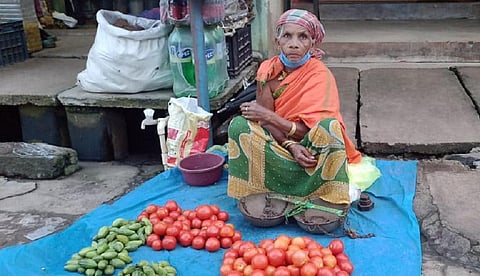COVID-19: How Koraput's tribal women hawkers are trying to recover livelihoods
The lockdowns induced by the novel coronavirus disease (COVID-19) pandemic has amplified the vulnerability of street vendors, pushing them towards hunger and deprivation.
Women are the breadwinners in the tribal families of Semiliguda block in Koraput district. They earn a daily income by selling vegetables on the roadside. The regulatory framework of this traditional, informal livelihood option remains ambiguous.
The pandemic has weakened the process to a much greater extent.
There are about 10 million street vendors in India, according to official estimates. They provide access to food to the country’s urban centres and occupy an important part of India’s informal economy.
Street vendors who sell items of daily need are not only for the tourists but also required for the development of urban poor, according to Women in Informal Employment, Globalizing and Organizing, an international research-policy network.
Street vending is the first resort for every person who moves to the city from the villages and gives them a hope for progress.
The tribulations of the vendors are far from over as the country recovers from the economic shocks of the pandemic. There is lingering hesitancy to buy from these vegetable vendors — even when the women are taking the produce to the doorstep — further denting their income.
Finding a space for the carts to sell their wares was difficult even after lockdowns, tribal women like Reema, 40, and Kamala, 35, shared.
Providing agency
The informal nature of the occupation has exposed the women street hawkers to economic, health and social risks.
At the same time, street vending empowered the women to earn a livelihood and magnify their voices.
Several policies and programmes, such as The Street Vendors (Protection of Livelihood and Regulation of Street Vending) Act, 2014, were enacted to regulate and protect the rights of these vendors and reduce the shortcomings.
Amid the catastrophic pandemic, the Pradhan Mantri Street Vendors’ Atma Nirbhar Nidhi Scheme was implemented by the Ministry of Housing and Urban Affairs June 1, 2020. It was a major breakthrough in empowering these vendors affected with the pandemic crisis and preventing their ongoing sufferings.
The Odisha government also announced a Rs 29 crore package to provide social security to street vendors affected by the pandemic. These policies have been very significant in capacity building among women street vendors and paving way for their development.
Livelihood creation, resilence building
The pandemic restricted the mobility of the women street vendors, pushing them to sell their wares online. As women employed in this trade rooted deeply in the country’s social fabric, these hawkers are more marginalised.
The current crisis is a test for these women, who are preparing themselves for every form of disaster to preserve their lives and family members. They are also making efforts for their social wellbeing and protecting their social and economic rights.
The endeavours by civil society groups and various organisations to aid these vendors should be promoted for their development and welfare.
Views expressed are the author’s own and don’t necessarily reflect those of Down To Earth.

